Armed Group In Iran Kills 3 Locals Fighting Alongside IRGC
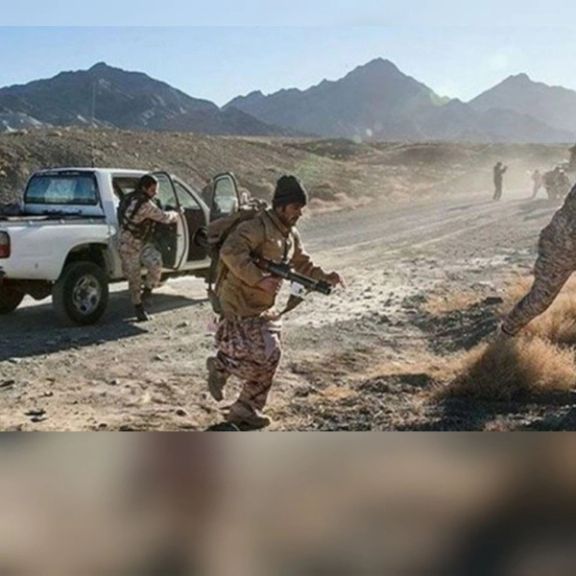
Three local members of the paramilitary Basij who were fighting armed groups alongside Revolutionary Guards in southeastern Iran have been killed, the IRGC said.

Three local members of the paramilitary Basij who were fighting armed groups alongside Revolutionary Guards in southeastern Iran have been killed, the IRGC said.
The clashes took place on Saturday in Korin district of Sistan-Baluchestan province, which has been the scene of clashes between the IRGC and a local armed group in recent weeks.
According to a statement, five members of the armed group were also killed and some injured during the skirmishes.
The Basij is a paramilitary force of the Islamic Revolutionary Guard Corps and mainly consists of young Iranians who volunteer, to receive benefits. Its members usually go through limited training to serve as an auxiliary force in local security activities and enforcing state control over society.
On December 25, two Revolutionary Guards were also killed in the country's restive southeastern region.
In recent years, Sistan-Baluchestan has been the scene of frequent clashes between Iranian security forces and drug smugglers and Sunni Baluch militant groups, which are designated as terrorist organizations by the Islamic Republic.
In February, a series of protests broke out in the province after over 20 Baluch fuel traders were killed by the IRGC at the Iran-Pakistan border.
Iran accuses the United States and its regional allies of providing support for armed groups that are active in the region.
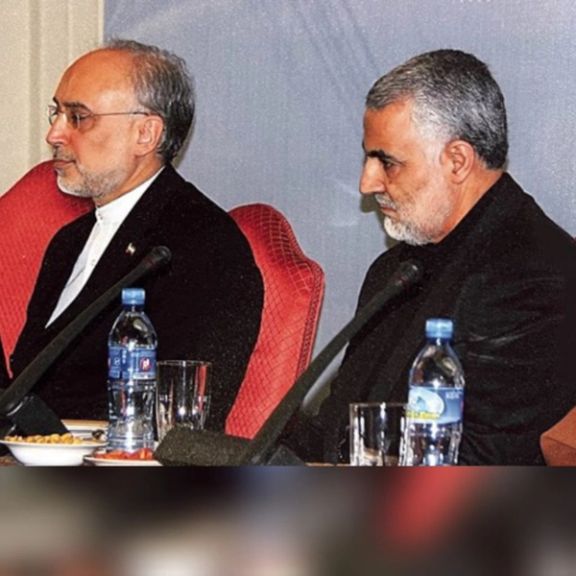
A senior Iranian politician has revealed Qasem Soleimani’s influence in Iran’s foreign policy, including the selection of ambassadors to several countries.
Soleimani who was Iran’s top military and intelligence operative in the Middle East was killed in a US drone strike in Baghdad two years ago.
Ali Akbar Salehi, who was Iran’s foreign minister under President Mahmoud Ahmadinejad and a former head of Iran’s Atomic Energy Organization, said in interviews published on Saturday that Soleimani was directly involved in the ministry’s activities during the so-called Arab Spring.
He said he had weekly meetings with Soleimani to coordinate policies of the foreign ministry and the Qods (Quds) in regional issues, particularly regarding Syria and Iraq.
He mentioned the appointments of Peyman Jebeli, the current head of Iran’s state broadcaster IRIB, as ambassador to Tunisia and Hossein Akbari to Libya.
He also talked about Iran’s support for the revolutionaries in Libya, saying Soleimani made it possible for injured protesters to receive treatment via Iran’s Red Crescent Society.
Salehi said that he had asked Soleimani for help in his secret negotiations with the United States in early 2013 in Oman. Salehi, then the foreign minister, added that he wanted Soleimani’s support to stop “friends at home” from derailing the talks.

Chanting anti-American slogans hundreds of people rallied in the Iraqi capital Baghdad on Saturday to mark the anniversary of the killing of an Iranian general.
A US drone strike on January 3, 2020 killed General Qasem Soleimani, who was the head of Iran’s elite Qods (Quds) Force, and Abu Mahdi al-Muhandis, deputy commander of Iran-backed militias in Iraq known as the Popular Mobilization Forces.
Supporters of Shiite factions aligned to Iran were bused in from across Iraq so that they could take part in the rally.
“We will not let you stay after today in the land of the martyrs,” some of the placards read. American and Israeli flags were strewn on the ground, with people trampling on them.
The killing of Soleimani and al-Muhandis pushed Iran and the United States perilously close to all-out conflict and sparked outrage among Iran’s supporters in Iraq, leading parliament to call for the expulsion of all foreign troops from Iraq.
The US-led coalition formally ended its combat mission to support Iraqi forces in their fight against the Islamic State group at the end of December.
Some 2,500 troops will remain for the foreseeable future, however, to continue supporting Iraqi forces in an advisory role.
Some militia leaders have insisted on the departure of all US troops.
Report by AP

A large fire sparked from an underwater pipeline has interrupted production at one of the platforms in Iran’s South Pars gas field in the Persian Gulf.
According to reports, the fire broke out Friday night in one of the transmission pipelines of phase 16 of the gas field, shutting down the platform.
Pars Oil and Gas Company said in a statement on Saturday that the production unit went out of operation although there was no fire on the platform itself and the accident had no human casualties.
It added that planning for repair work began as soon as the fire in the nearby pipeline was contained. Repairing such a pipeline may take several weeks.
The statement said lightning was the cause of the fire, noting that it ignited gas, which was leaking from the underwater pipeline. "The gas emitted to the water level was ignited by lightning 15 kilometers from the platform," the operating company stated.
An expert speaking to Iran International commented that the leak must have been a significant one to have caused a fire and the pipeline should be considered out of actions for a long time. Apparently, Iran used domestically produced pipes for laying the line in 2015, which would not meet industry standards, he said.
A source has told the semiofficial Mehr news agency that the 100-kilometer pipeline had many technical problems, and 70 kilometers of it had been replaced, but the remaining 30-kilometer segment was under repair. He added that the accident happened after 15 million cubic meters of methane-rich gas was injected into the pipeline.
After a video footage began circulating on social media, the state broadcaster moved to react and said the damage was not large.
The frequency of accidents in Iran’s energy facilities is increasing with some blaming lack of proper maintenance of the aging infrastructures and some suspecting sabotage by other countries, presumably Israel.
Production at the South Pars gas field has been dropping gradually in recent years as Iran is unable to make the necessary investments and improve its technology due to various sanctions. Last year, the field produced 70 percent of Iran’s daily 690 million cubic meters of natural gas output.
Meanwhile, with the world’s second largest gas reserves, Iran is unable to keep up with growing domestic demands, leading to frequent power cuts, although dirty fuels are substituted at power stations.
The incident must have reduced at least 15 million cubic meters of daily production, which can put further pressure on domestic gas supplies amid cold winter months.
Last winter, Iran experienced large power cuts in major cities. Protests broke out on a few occasions. When authorities started burning mazut, a dirty unrefined fuel to generate electricity, it led to heavy pollution in cities adding to the popular anger.
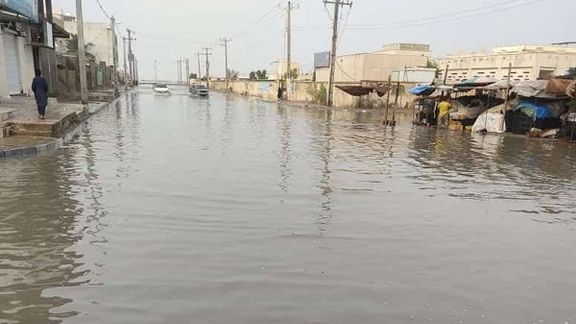
Floods caused by torrential rains have swept through drought-stricken Iran disrupting electricty and clean water in the worst-hit areas of the south and east.
Head of the crisis management taskforce of Hormozgan province said on Saturday that an eight-year-old girl was drowned by floodwater in Bandar Abbas. He added that about 30 villages lost power and a lot of roads are blocked, making rescue operations even harder and slower. Floods have also caused damage to agricultural lands, houses and infrastructure.
In the eastern province of Sistan-Baluchestan, the flood has caused enormous material damage, leading to the closure of schools, shops and offices. The province was already suffering from lack of clean water amid a drought.
The director of the Bushehr meteorological office said on Saturday that heavy rain has caused seasonal rivers to overflow their banks which led to flooding of thoroughfares in several cities. He also spoke about serious damage to the farmlands and orchards.
Mehdi Valipour, the head of Iran’s Red Crescent Society, said on Friday that rescue operations were underway in about a dozen flood-stricken provinces.
Iran’s Meteorological Organization has predicted more rains, blizzards, thunderstorms, and hails for almost all the country in the next five days.
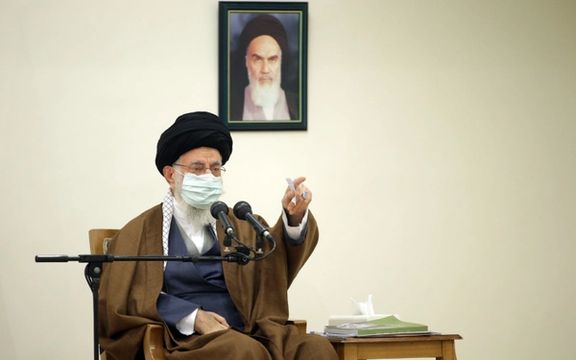
Iran’s leader has lashed out at former US president Donald Trump and others for the killing of Qasem Soleimani, saying they “will pay back for their crime.”
Supreme Leader Ali Khamenei insisted that the IRGC general will remain in history as a martyr whereas his killers will be forgotten.
During a meeting with Soleimani’s family and close collaborators on the second anniversary of his death Khamenei described him as a martyr and symbol of “resistance” in the region, stressing, “Martyr Soleimani is more dangerous to his enemies than Commander Soleimani”.
“Resistance” or “Resistance front” is a term used by the Islamic Republic to refer to its anti-Western allies and proxies throughout the region, from Hezbollah in Lebanon to Houthis in Yemen, the Syrian president Bashar al-Assad and Iraqi Shiite militias.
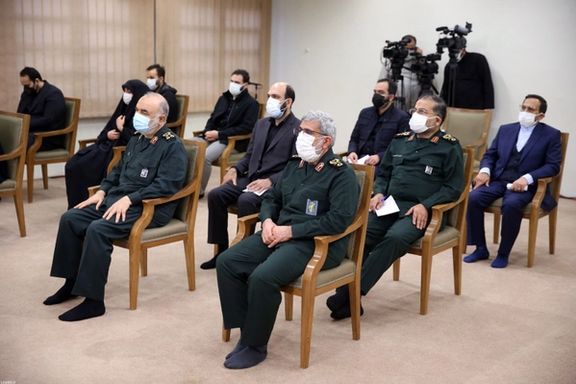
Khamenei said, “Trump and others like him will be forgotten and lost in the dustbin of history, of course after paying for their crimes in the world.”
As the country is getting ready to hold ceremonies for the second anniversary of Soleimani’s killing threats and rhetoric by Iranian officials have increased. Iran is planning a long list of events lasting ten days to mark Soleimani’s “martyrdom”. He was killed by a US drone strike on January 3, 2020, as he arrived in Baghdad.
He was Iran’s top military and intelligence operator in the Middle East, organizing proxy forces.
Soleimani played a major role in the Syrian civil war as the coordinator of Iran’s military involvement, including sending tens of thousands of regular and irregular forces to fight in support of Assad.
Iranian officials have often threatened retribution against American and Israeli officials that they have listed as having been involved in ordering, planning and carrying out the drome strike that killed Soleimani. Shortly after his death, Khamenei in January 2020 had said that those responsible for ordering and carrying out the killing had to pay for their actions.
Soleimani’s successor as commander of the extra-territorial Qods (Quds) force, Esmail Ghaani (Qaani) and other officials have also called for retribution against Trump and others.
Iran’s hardline leader said that two years after Soleimani’s death Iran’s proxies are now in a stronger position and more infused with hope.